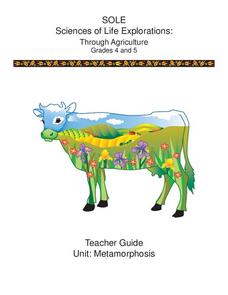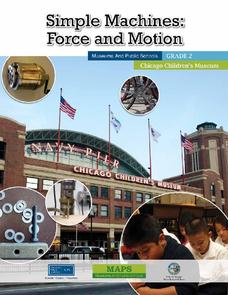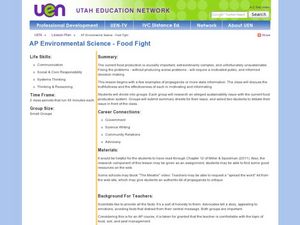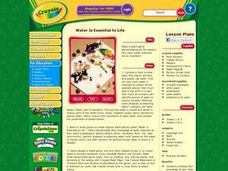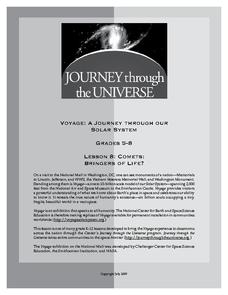Desert Discovery
Life Cycle of the Saguaro
Third graders make books which illustrate the growth and development of a saguaro cactus from its beginnings as a seed all the way through its death. They trace the life cycle of the saguaro, identify each of the stages in its life, and...
Baylor College
Energy for Life (Energy from Food)
Energy comes in many forms, but how do living things get the energy they need to survive and thrive? In a simple, controlled experiment with yeast, water, and sugar, groups make observations about how yeast reacts with water alone, then...
Cornell University
Metamorphosis
Looking for an insect unit that addresses multiple skill strategies? Young entomologists explore multiple life cycles of insects that go through metamorphosis. The brainteasers and mobile activity spark learner interest before guiding...
Howard Hughes Medical Institute
Ocean Acidification
Human impacts on the environment can sometimes be difficult to measure, especially under water! An activity centered on ocean acidification gives science scholars the opportunity to examine the effects of carbon dioxide on marine life....
NOAA
Seafood and Human Health
Whether your young biologists realize it or not, humans play a significant role in marine ecosystems. To help them understand this fact children first create graphical representations that show homo sapiens' place in marine food chains,...
Curated OER
Whale Song Acrostic
What do whales sing about? Invite your class to imagine the thoughts of whales before writing acrostic poems on the topic. The plan blends together a bit of life science with plenty of opportunities for creativity and writing.
Education Outside
Plant, This Is Your Life!
Individuals select a plant, illustrate it in their journal, record observations, and create a life story for their plant that accounts for its features and any unique properties. Using these descriptions, a partner attempts to locate...
Desert Discoveries
What's In A Habitat?
The concept of a habitat being a home for animals is the main thrust of this life sciences resource. Learners complete a cut-and-paste activity using a fine worksheet that's embedded in the plan. They must place four very different...
Curated OER
Vocabulary: Life Science: Animal Life Cycles
Students read and discuss vocabulary words about animal life cycles. In this animal life cycles lesson plan, students use the bulletin board for repeated use in referring to their vocabulary words.
Curated OER
Talking Trash - Marine Debris
Students bring in different trash items and define "marine debris" through a discussion about these items. They categorize debris and use statistics and graphing to better explain the types and amounts of marine debris found each yea
NOAA
Deep-Sea Ecosystems – Life is Weird!
A pool of brine in the deep sea can be up to four times as salty as the surrounding sea water. The deep sea ecosystem relies on chemosynthesis and the organisms that live there are often strange to us. The lesson focuses on researching...
National Park Service
The Secret of Life
Dead trees provide nutrients for the soil, food for animals, protection and a home for organisms, a seed-bed for new trees, and a place for nitrogen-fixing bacteria to live. In the activity, pupils collect decaying logs, expose them to a...
NOAA
History's Thermometers
How is sea coral like a thermometer? Part three of a six-part series from NOAA describes how oceanographers can use coral growth to estimate water temperature over time. Life science pupils manipulate data to determine the age of corals...
Curated OER
Home Living / Daily Living: Dressing for the Weather
What to wear? Help your special needs class make independent choices about what they should wear during various weather conditions. They'll discuss weather-appropriate clothing, dress dolls for the weather outside, and even put on a...
Alabama Wildlife Federation
Pasta Butterfly
From an egg to an adult and the stages in between, the butterfly leads a very active life. A hands-on activity has learners act out the different life cycle stages of the butterfly before venturing on an identification expedition. During...
Curated OER
Home Living / Daily Living Lesson Plan—Mastery Healthy Food
Everyone needs to know how to eat well to stay healthy. Learners with mild disabilities log what they eat, discuss food choices, and review healthy foods. The lesson could be used to foster living skills in high-functioning individuals...
Chicago Children's Museum
Simple Machines: Force and Motion
Get things moving with this elementary science unit on simple machines. Through a series of nine lessons including teacher demonstrations, hands-on activities, and science experiments, young scientists learn about forces, motion, and...
Smithsonian Institution
Water/Ways: The Poetry of Science
Water is the source of life. It appears in poetry in both peaceful and torrential descriptions; it appears in earth science in its liquid, gaseous, and solid states. Combine these interpretations of our planet's most precious and...
Curated OER
AP Environmental Science-Food Fight
The content in this lesson is of a controversial nature. Please review to make sure it is suitable for your class. A video, The Meatrix is shown to the class, and then they discuss the emotionally-charged language that it uses. They are...
American Forest Foundation
Who Speaks for the Trees?
Help young conservationists appreciate the important role that trees play in ecosystems around the world with this collection of six engaging activities. From a shared reading and class discussion of Dr. Seuss' The Lorax, to in an depth...
Curated OER
Water is Essential to Life
Young scholars increase their knowledge of why clean water resources are essential to the survival of plants, animals, and people. They deomonstrate their understanding of the role of water for sustaining life by creating an original...
Teach Engineering
The Great Pacific Garbage Patch
The Great Pacific Garbage Patch is one of several garbage patches around the world where garbage accumulates naturally. As part of a GIS unit that combines oceanography, environmental science, and life science, class members investigate...
Journey Through the Universe
Comets: Bringers of Life?
Young scientists investigate the elements found in our solar system and then construct a model of a comet. They apply their new knowledge to the formation of the solar system.
Core Knowledge Foundation
A Time for All Seasons - Fall
The weather is cooling down and the leaves are starting to change color; fall is right around the corner. Celebrate this special time of year with this earth and life science lesson series that teaches children about the causes of...
Other popular searches
- 4th Grade Life Sciences
- Marine Sciences
- Life Sciences Succession
- 3rd Grade Life Sciences
- Life Sciences Plants
- Nutrition and Life Sciences
- Current Life Sciences
- Life Sciences First Grade
- Life Sciences Mi
- Life Sciences Cloze Activity
- Life Sciences Cells




